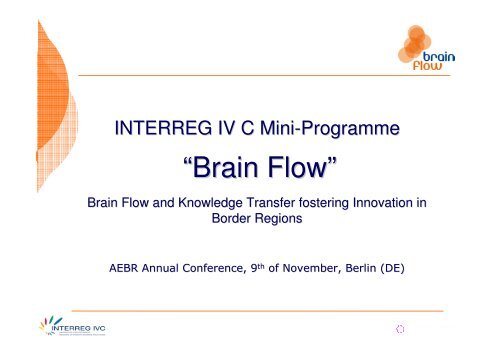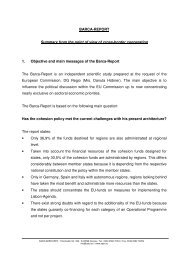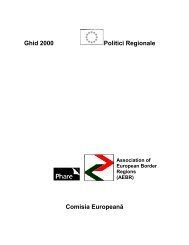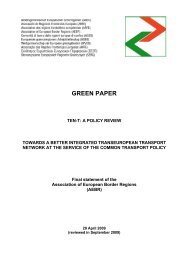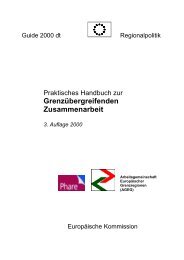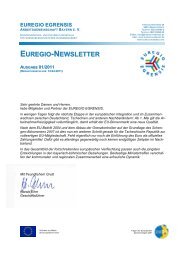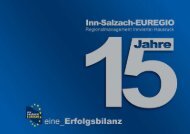Ilka Meisel - Association of European Border Regions
Ilka Meisel - Association of European Border Regions
Ilka Meisel - Association of European Border Regions
You also want an ePaper? Increase the reach of your titles
YUMPU automatically turns print PDFs into web optimized ePapers that Google loves.
INTERREG IV C Mini-Programme<br />
Mini Programme<br />
“Brain Brain Flow” Flow<br />
Brain Flow and Knowledge Transfer fostering Innovation in<br />
<strong>Border</strong> <strong>Regions</strong><br />
AEBR Annual Conference, 9 th <strong>of</strong> November, Berlin (DE)
INTERREG IV C<br />
INTERREG IV C is implemented within objective 3 “<strong>European</strong> Territorial<br />
Cooperation” (2007-2013) and is financed by the <strong>European</strong> Regional<br />
Development Fund (ERDF)<br />
INTERREG IV C is geared towards regional and local public policy actors<br />
from the 27 member states as well as Norway and Switzerland<br />
Main aim is to improve the effectiveness <strong>of</strong> regional policies and instruments.<br />
Projects build on the exchange <strong>of</strong> experience in two thematic fields:<br />
1) Innovation and the knowledge economy<br />
2) Environment and risk prevention<br />
AEBR Annual Conference in Berlin, 9 th <strong>of</strong> November 2012
“Brain Flow” – Facts & Figures<br />
• Approved in the INTERREG IVC Programme’s 2 nd call<br />
(2009)<br />
• Priority 1: Innovation and the knowledge economy<br />
• Sub-theme: Employment, human capital and education<br />
• Duration: 01 February 2010 – 31 January 2014<br />
• Total budget:<br />
3.520.000,00 EUR<br />
ERDF<br />
2.270.000,00 EUR<br />
EU-Partner co-financing 730.000,00<br />
EUR<br />
Norwegian fund<br />
400.000,00 EUR<br />
Swiss contribution 120.000,00<br />
EUR<br />
AEBR Annual Conference in Berlin, 9 th <strong>of</strong> November 2012
The Partnership<br />
Eight border regions from seven<br />
<strong>European</strong> countries<br />
Ministry for Economic Affairs, Energy,<br />
Building, Housing and Transport <strong>of</strong><br />
the State <strong>of</strong> North Rhine-Westphalia,<br />
DE<br />
(Lead Partner)<br />
Province <strong>of</strong> Gelderland, NL<br />
Province <strong>of</strong> Overijssel, NL<br />
County Administrative Board <strong>of</strong><br />
Värmland, SE<br />
Nemunas Euroregion Marijampole<br />
Bureau, LT<br />
Regio Basiliensis Northwest<br />
Switzerland, CH<br />
Hedmark County Council, NO<br />
Region <strong>of</strong> Navarre, ES<br />
AEBR Annual Conference in Berlin, 9 th <strong>of</strong> November 2012<br />
© Poplar<br />
Geographical coverage <strong>of</strong> the partnership
What is “Brain Flow” about?<br />
• The Mini-Programme deals with the increasing loss <strong>of</strong> highly<br />
skilled human capital through the movement to more<br />
favourable economic environments, the so-called “brain-drain /<br />
brain-gain” phenomenon.<br />
• Due to their geographical and socio-economic<br />
characteristics, border regions are particularly touched by<br />
the lack <strong>of</strong> qualified workforce<br />
border regions need to find new policies and instruments to<br />
handle these changes<br />
AEBR Annual Conference in Berlin, 9 th <strong>of</strong> November 2012
The main aim…<br />
…<strong>of</strong> the Mini-Programme is<br />
“to enable regional authorities and other regional and local actors<br />
to develop and improve their policies and instruments to counter<br />
the outflow <strong>of</strong> highly educated and qualified people (brain-drain)<br />
and to attract and retain human capital (brain-gain) in their regions<br />
in support <strong>of</strong> their innovation capacity and competitiveness”<br />
AEBR Annual Conference in Berlin, 9 th <strong>of</strong> November 2012
The Approach (1/2)<br />
The interregional exchange will take place on 2 levels:<br />
1) The overall (strategic) Mini-Programme level<br />
2) The individual (practical) sub-project level<br />
Both levels address three interrelated priorities:<br />
1) Increasing regional attractiveness<br />
2) Supporting key economic sectors<br />
3) Improving the higher education system<br />
Through the implementation <strong>of</strong> interregional sub-projects, a more<br />
intense discussion on specific (inter)regional policy strategies,<br />
instruments as well as “good practices” will be achieved and<br />
experiences will be exchanged across Europe.<br />
AEBR Annual Conference in Berlin, 9 th <strong>of</strong> November 2012
The Approach (2/2)<br />
Exchange <strong>of</strong> experience and knowledge transfer <strong>of</strong> existing<br />
strategies, policies und instruments to attract and bind<br />
human capital to the region<br />
Building <strong>of</strong> a common knowledge base<br />
Development <strong>of</strong> new approaches and instruments<br />
Implementation <strong>of</strong> the results in the regions in order to<br />
initiate modernised regional policies<br />
AEBR Annual Conference in Berlin, 9 th <strong>of</strong> November 2012
Main Activities<br />
• Annual Conferences to disseminate the Brain Flow<br />
achievements and experiences gained among the partner<br />
regions to a wider public<br />
• Thematic Exchange <strong>of</strong> Experience Meetings to fuel the<br />
cooperation on strategic level<br />
• Implementation <strong>of</strong> Sub-Projects to design new<br />
partnerships, to exchange “good practices” and to<br />
develop new approaches on the operational level<br />
AEBR Annual Conference in Berlin, 9 th <strong>of</strong> November 2012
8 “Brain Flow” Sub-Projects …<br />
… with different thematic focus:<br />
• BUTTON: regional attraction and retention strategies gathered in a best<br />
practice toolkit<br />
• BRAND: retention and re-attraction <strong>of</strong> highly skilled by making use <strong>of</strong><br />
alumni networks<br />
• BPCM: the human capital dimension <strong>of</strong> cluster strategies<br />
• Quality <strong>of</strong> Life: understanding the concept <strong>of</strong> life quality for talents and<br />
using it for enhanced regional strategies<br />
• STEP forward: students, teachers, entrepreneurs & policy makers network<br />
development to address, bind and re-attract the higher educated<br />
• LaGoTa: action groups <strong>of</strong> policy makers using synergies by making explicit<br />
policies<br />
• TASS: public support services for non-EU highly skilled workers<br />
• BordInfo<br />
Total <strong>of</strong> 49 partners involved in our 8 sub-projects<br />
AEBR Annual Conference in Berlin, 9 th <strong>of</strong> November 2012
Want to know more?<br />
Visit us on:<br />
www.brain-flow.eu<br />
“Brain Flow“ Coordination Unit<br />
Ministry for Economic Affairs, Energy and Industry <strong>of</strong> the State<br />
<strong>of</strong> North Rhine-Westphalia<br />
Haroldstraße 4<br />
DE - 40231 Düsseldorf<br />
phone: +49 (0) 211 / 837 - 2347<br />
Email: brain-flow@mweimh.nrw.de<br />
AEBR Annual Conference in Berlin, 9 th <strong>of</strong> November 2012


